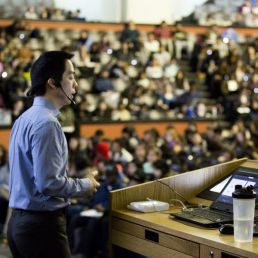Prof Kenneth Yip learned early in his career that he really enjoys teaching from giving classes as a post-doctoral researcher. “I love to see that students are excited about science and I enjoy hearing questions that show they understand the material and are eager to learn more. My favourite feeling is finishing a lecture that I know has been well understood!” Yip’s dedication has earned him a promotion to Assistant Professor in the Department of Cell & Systems Biology.
Yip is often the first professor for life sciences students in the introductory BIO130 course, who may encounter him again in second year Biotechnology or third year Cellular Dynamics courses. He structures his lessons to be clear and easy to understand with anecdotes about the process of scientific discovery. His teaching techniques use evidence-based strategies to improve student success and have made him a favourite instructor for many students.
Yip’s research at the Princess Margaret Cancer Centre means that his students learn the latest advances in molecular and cell biology. He is proud that his recent research revealed a new mechanism of radiation-induced fibrosis, and allowed development of drugs to regulate the metabolic dysregulation behind this syndrome. In addition to practical bench skills, Yip has expanded his knowledge by studying regulatory compliance, bioethics, and online instruction techniques. A further biological phenomenon that Yip craves is the rumble deep in his body that comes from watching Formula One racing.
Graduate Teaching Assistants who provide a more personal approach to the thousands of students who take introductory biology rely on Yip for guidance on their teaching. He mentors these TAs by encouraging them to think about what they want to achieve through the course, by guiding the more mature senior students to lead their peers, and by helping them with CVs and applications.
Yip works closely with Prof Melody Neumann on testing innovative pedagogical techniques in the classroom. He wants to use the freedom afforded by his new appointment to build on these collaborations and develop some of his own innovations. Congratulations, Professor Yip!

